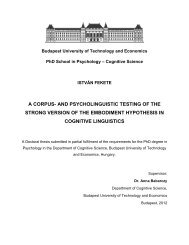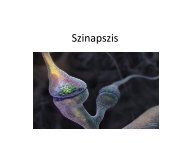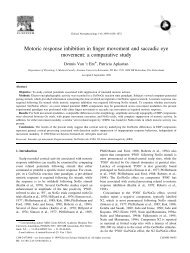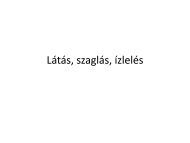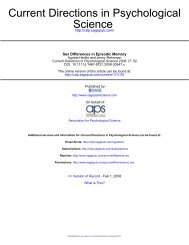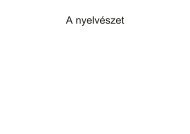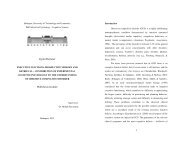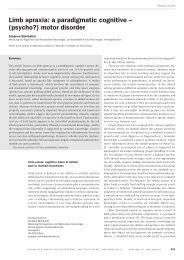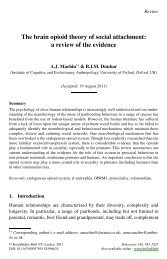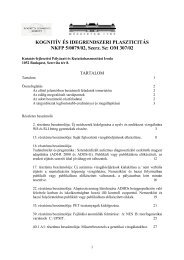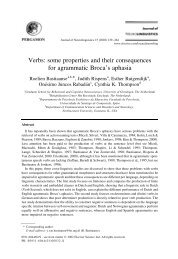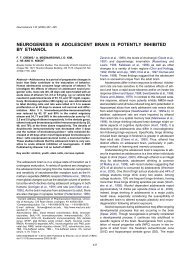Gyula Demeter
Gyula Demeter
Gyula Demeter
You also want an ePaper? Increase the reach of your titles
YUMPU automatically turns print PDFs into web optimized ePapers that Google loves.
Abstract<br />
The exact nature of the neurocognitive deficit behind the clinical symptoms in obsessive-<br />
compuslive disorder (OCD) is still unclear. There is a growing amount of evidence about the<br />
executive system deficit in OCD, which is strongly connected to the fronto-basal loop<br />
dysfunctions of the disorder. The theoretical background of our research on executive<br />
functions rests on the psychometric model proposed by Miyake et al., (2000). Through latent<br />
variable analyses, this model defines three main components of executive functions:<br />
updating/monitoring, shifting and inhibition. In our research we assessed the executive<br />
functions of OCD patients and healthy controls. This approach led to evidence about the<br />
impairment of the shifting and inhibition components and to the description of the relations<br />
between symptoms and different neuropsychological indices.<br />
In our view the executive system deficit in OCD is strongly related to the specific prospective<br />
memory dysfunction. This ability makes possible to retain, to recall and to execute an<br />
intention in the appropriate time and context of the future. An important phase comes after the<br />
realization of the intended actions: the cancellation of the successful action representations<br />
after attaining a goal. This phase could be impaired in OCD. In this setting the goal can be<br />
achieved by the constant monitoring of the environment or by the periodical refreshing of the<br />
intents and strategic and automatic processes are also involved. According to our view in<br />
OCD we face a hyperactivity of the prospective memory system resulting in constant<br />
monitoring of the environment. We hypothesize that the impaired inhibition component of the<br />
executive system is responsible for this hyperactivity. The patients commit significantly more<br />
errors and slow down in the event-based prospective memory tasks’ ongoing part than the<br />
matched control subjects. It is possible that OCD patients are unable to inactivate successfully<br />
realized intentions and due to inhibition deficit the previous task remains on their “to execute<br />
list”. This contributes then to the observed obsessive-compulsive behavior. The missing of the<br />
retrieval induced forgetting effect in OCD according to our results might be explained by the<br />
dysfunction of conflict detection processes. We have demonstrated this effect in a series of<br />
experiments with healthy adults. It persist also in the long term if there is no additional<br />
rehearsal and a period of nocturnal sleep is included before the recall. We think that the<br />
inclusion and development of tasks in the cognitive behavioral therapy of patients are<br />
essential to increase the effectiveness of inhibition mechanism and prospective memory<br />
performance.<br />
vii



